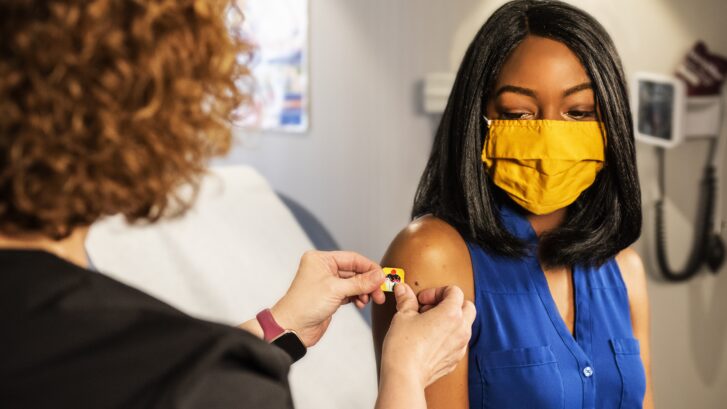What Women Should Know about the COVID-19 Vaccines
Our concierge primary care doctors in Jupiter have been monitoring the news for the most recent updates on the coronavirus vaccines. As we’ve been finding out more, we want to share the latest news with you. Today, we discuss what women should know about the COVID-19 vaccines.
Pregnant women
Last month the Centers for Disease Control and Prevention (CDC) finally resolved the question of whether pregnant women could safely receive COVID-19 vaccines. The question arose because the initial trials for the vaccines had excluded pregnant women. As a result, different health organizations had offered conflicting guidance.
But CDC Director Rochelle Walensky said during a recent White House coronavirus briefing that vaccine-reporting systems had shown no safety concerns. This includes women in their third trimester and for their babies.
“We know that this is a deeply personal decision,” she said, “and I encourage people to talk to their doctors and their primary care providers to determine what is best for them and for their baby.”
This is welcome news for women. Many want to receive the vaccine, but have been leery of taking it for fear of harming their unborn babies.
In fact, just the opposite seems to be true, according to several recent preliminary studies. These have consistently shown women who received one of the mRNA vaccines (either Pfizer or Moderna) while pregnant appear to pass COVID-19 antibodies to their babies before birth. And at least one study has detected antibodies in the mothers’ breast milk. (Such studies have not yet been conducted on the newer Johnson & Johnson vaccine.)
The discovery of COVID-19 antibodies in pregnant women’s umbilical cord blood confirmed earlier observations. Mothers could transfer immunity to their babies by receiving the vaccine. This is good news, since babies (and young children) cannot yet be vaccinated for the coronavirus. It also protects their mothers, according to the CDC. Pregnancy is a high-risk factor for severe illness and complications from COVID-19, including preterm birth,
Mammograms and the vaccine
Getting mammograms shortly after receiving a coronavirus vaccine, however, is another story. That’s because the timing of the vaccine can affect the read of the mammogram, according to a recent report from West Palm Beach on WPTV.
Dr. Courtney Hoey, a breast radiologist at Good Samaritan Medical Center, told the station that radiologists do more than just examine the breast tissue for signs of cancer.
“We don’t just look at abnormalities within your breast tissue,” she said. “We look at things like the skin and lymph nodes in the underarm area.” Because a COVID-19 vaccine—specifically, the Moderna vaccine—can cause temporary swelling in the nodes under the arm where women receive the vaccine, this can affect the accuracy of the mammogram.
Such swelling is a good sign, she said, because it means the immune response is working. But it could necessitate a follow-up ultrasound just to be sure.
Nevertheless, she advises women not to hesitate receiving the vaccine, because that’s more important. Unless there are breast issues such as new symptoms, pain, lumps, or nipple discharge, it’s better to get the vaccine as soon as possible, she said.
If you feel you need a mammogram due to such issues, go ahead and do both. Let your radiologist know that you’ve just had the vaccine, and they can take that into account.
The Johnson & Johnson vaccine
With the Johnson & Johnson vaccine, of the 15 cases of rare blood clots reported, all occurred in women under age 60. Three of those have died, while seven remain hospitalized, four in critical condition.
Washington Post columnist Dr. Leana Wen estimates 15 cases out of eight million equals a risk of less than two in a million. But for women under 50, the risk rises to about one in 80,000. On the other hand, the CDC estimates for every million doses of the vaccine in women under age 50, 12 deaths would be prevented.
The CDC and the U.S. Food and Drug Administration (FDA) conducted a thorough review during a “pause” in distribution last month. The panel concluded that the vaccine’s distribution should resume with no restrictions.
Dr. Francis Collins, director of the National Institutes of Health (NIH), spoke with NBC’s Chuck Todd. He said the vaccine’s benefits outweigh the risk from possible blood clots.
“We clearly have a situation where the benefits greatly outweigh the risks, even for younger women,” he said on “Meet the Press” late last month.
Women under age 50 who are concerned about the blood clot risk with the Johnson & Johnson vaccine can opt for one of the other two if they’re available. If you don’t have a choice, we agree with Collins. The risk of those rare blood clots is weighed against the risk of dying from COVID-19- there’s no comparison. We recommend you get your COVID-19 vaccine as soon as possible.
If you have any concerns about these or other issues related to the vaccines, please don’t hesitate to ask us.

